- Home
- Upton Sinclair
A Cadet's Honor: Mark Mallory's Heroism Page 6
A Cadet's Honor: Mark Mallory's Heroism Read online
Page 6
CHAPTER VI.
INDIAN'S RE-EXAMINATION.
It was a rare opportunity. The six yearlings made for camp on a run, andthere an interesting conference was held with a few more choice spirits,the upshot being that the whole crew set out for barracks again in highspirits, and looking forward to a jolly lark.
They entered the building, causing dire fear to several anxious-lookingplebes who were peering out of the windows and wondering if thisparticular marauding party was bound in their direction. It was one ofthe empty rooms that they entered, however, and there they proceeded tocostume one of their number, putting on a huge red sash, some medals, afew shoulder straps borrowed for the occasion, and, last of all, a falsemustache. This done, they hastened over to the room where theunfortunate "Mormon" still sat. The "officer" rapped sharply on thedoor.
"Come in," a voice responded weakly; the cadets came.
"Mr. Smith, sir?" inquired the personage with the mustache.
"Yes, sir," said Indian, meekly, awed by the man's splendor.
"I have been requested by certain of the cadets of the United StatesMilitary Academy to investigate the circumstance of your alleged passingat the recent examination. I have been informed by these same gentlemanthat when questioned by them you exhibited stupidity and ignorance sovery gross as to cause them to doubt whether you have any right to callyourself a cadet at all."
Here the cadets shook their heads solemnly and looked very stern indeed.
"Bless my soul!" cried Indian.
"In order to consider these very grave allegations," continued theother, "a special meeting of the Army Board was first convened, with thefollowing result:"
Here the speaker paused, cleared his throat pompously, and drew forth afrightfully official-looking envelope, from which he took a largeprinted sheet with the West Point seal upon the top.
"United States Military Academy, West Point, June 20th," he read--thatis the way all "orders" begin. "Cadet Joseph Smith, of Indianapolis,Indiana, it has just been ascertained, was admitted to the duties ofconditional cadet through an error of the examining board. Are-examination of Cadet Smith is hereby ordered to be conductedimmediately under the charge of the lord high chief quartermaster of theacademy. By order of the Academy Board. Ahem!"
The lord high chief quartermaster finished, and Cadet Smith sank downupon the bed in horror.
"Sir!" shouted the officer, "how dare you sit down in the presence ofyour superiors? Get up, sir, instantly!"
Indian "got," weak-kneed and trembling.
"The examination will be held," continued the cadet, "in the ObservatoryBuilding, at once. Gentlemen, you will conduct Mr. Smith there and awaitmy arrival."
The bogus officer desired time to change his uniform, as he knew itwould be risky to cross the parade in his borrowed clothing.
Now the Observatory Building is situated far away from the rest of theacademy, upon the hillside near Fort Putnam. And thither the party setout, the cadets freely discussing the probable fate of the unhappyplebe. It was the almost unanimous verdict that one who was sounutterably stupid as never to have heard of the great Joseph Smithwould not stand the ghost of a show. All of which was comforting to thelistening victim.
The Observatory was deserted and lonely. The door was locked, and theparty gained entrance by the windows, which alone was enough to exciteone's suspicion. But Indian was too scared to think.
The lord high chief quartermaster presently slipped in, once morebedecked with medals and mustache.
The examining party got to work at once in a very businesslike andsolemn manner. The physical examination was to come first, they said. Ithad been the opinion of the Army Board that Mr. Smith was far too fat tomake a presentable cadet. The surgeons were busy that afternoon intrying to piece together several plebes who had been knocked all topieces by the yearlings for being too "B. J."--this was the explanationof the lord high chief quartermaster--and so it would be necessary toexamine Indian here, and at once, too. And if it were found, as, indeed,would most probably be the case, that he was too fat, why then it wouldbe necessary for him to reduce weight immediately.
Several schemes were suggested as to how this might be done. There wasthe Shylock, the Shakespearian method, of a pound of flesh from near theheart. Cadet Corporal So-and-So suggested that several veal cutlets fromthe legs--each an inch thick--would serve. A veal cutlet an inch thickhe estimated--his great grandfather on his mother's other side had beena butcher, he stated--would weigh three pounds. Then Acting CadetSergeant Somebody-Else suggested a Turkish bath, the jockey's method,together with very violent exercise. This plan was adopted finally asbeing the least likely to be fatal in its results.
But just then somebody suddenly thought of the fact that it would bebest to weigh the subject first, which was considered a good idea, butfor the fact that they had no scales. This trouble "feazed" the crowd atfirst. Then the lord high chief quartermaster said that he was afirst-rate judge of weight, having slaughtered hogs in his youth, andcould tell by the feel. So Mr. Joseph Smith must be immediately"boosted" up and balanced upon the cadet's outstretched hand, there tobe shaken and otherwise tested, while the man below made audiblecalculations by means of trigonometrical formulas as to what was hisactual weight.
The result of this experiment, as might have been expected, was by nomeans very definite. The lord high chief, etc., thought the weight wastoo much, but he couldn't be sure. And then Cadet "Admiral" Jonesproposed another scheme. He had been a juggler "when he was young;" hewas used to tossing heavy weights; in fact, he just happened to knowthat he could throw three hundred pounds exactly twelve feet, the heightof the ceiling. It was obvious, therefore, that if Indian weighed overthat he would not reach the ceiling; but if he should go through theceiling that would mean just as clearly that he was under the limit andneed not "reduce."
In vain did the frightened boy protest that he weighed only one hundredand fifty; the test must be made, and made it was. Indian's terrifiedform did not once get near the ceiling, and so reduce he must. Thecadets formed a circle about the room.
"Now," said the commanding official, "now you must manage to reduceweight quickly this way, or we shall try the veal cutlet scheme. Soyou'll find it best to hurry. We want you to run around the outside ofthis circle. We'll give you just ten and one-quarter minutes by my watch(which runs very fast, by the way) to get around fifty times. And inthe course of that you must manage to perspire fifteen pounds of weight(enough to make you go through the ceiling). This is equal to half agallon of water. Now then! Take off your coat, sir. Ready! Set!! Go!!!Why don't you start, sir? There now! Hurry up! One second--twoseconds--three--four--fi'--six--sev'n--eight--nine--ten--'leven! Faster!Faster!! Hurry up! One minute! You haven't lost a pound yet! What! Outof breath already? Faster! That's right! Keep it up now!"
The scene at this stage of the "examination" is left to the imagination;Indian, wild-eyed, panting and red, plunging wildly around in a dizzycircle of a dozen laughing cadets. And in the center the lord high withhis watch slowly telling off the minutes.
"Two minutes there, two minutes! Come now, hurry up! Don't begin to lagthere! Why don't you stop that panting? There goes the first drop ofperspiration. Hooray, there's another! It'll soon be a gallon now. Twoand a quarter!"
Poor Joseph kept it up to five, by which time he was so dizzy that hecould not stand up; which was the best reason in the world why he sankdown utterly breathless in the corner. And there he lay gasping, thecadets in vain trying to get him to rise.
"I think," said the presiding officer, nearly convulsed withlaughter--"I think that is reduction enough for the present, and I saywe proceed to the 'mental.'"
A conference was held over in one corner of the room, as to what thequestions should be; and then in an evil hour (for them) an idea struckone of the cadets.
"See here, fellows," said he. "I think he's been examined enough. Let'sget somebody else. Let's get---- Who's that learned chap?"
"Stanard?"
"Oh, yes, Stanard! The Parson! Let's get him."
The idea took with a rush. It would be so much more fun to fool thelearned Parson! And in a minute or two half the party, including thelord high chief quartermaster, was on its way back to barracks to huntup the new victim, while the rest stayed to resuscitate Indian and towrite out a list of questions for the "mental examination."

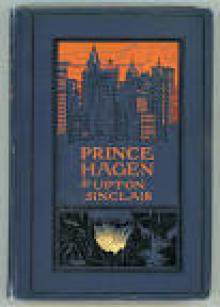 Prince Hagen
Prince Hagen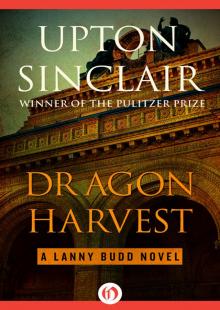 Dragon Harvest
Dragon Harvest The Jungle
The Jungle Sylvia's Marriage
Sylvia's Marriage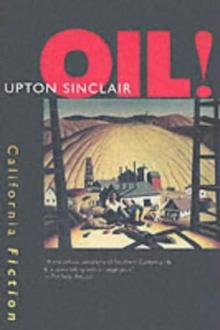 Oil! A Novel by Upton Sinclair
Oil! A Novel by Upton Sinclair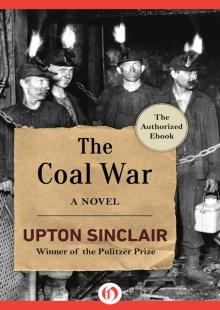 The Coal War: A Novel
The Coal War: A Novel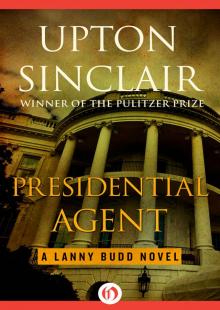 Presidential Agent
Presidential Agent World's End
World's End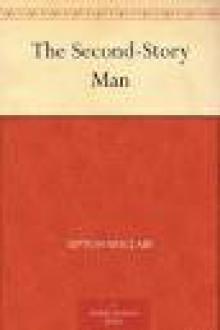 The Second-Story Man
The Second-Story Man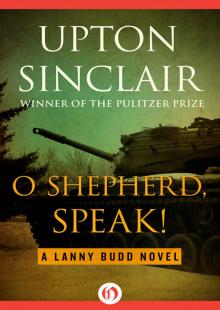 O Shepherd, Speak!
O Shepherd, Speak!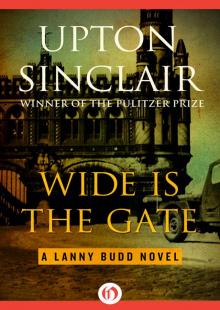 Wide Is the Gate
Wide Is the Gate The Return of Lanny Budd
The Return of Lanny Budd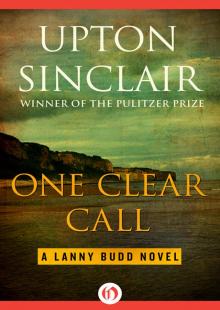 One Clear Call I
One Clear Call I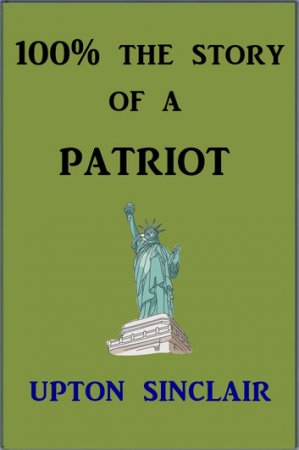 100%: the Story of a Patriot
100%: the Story of a Patriot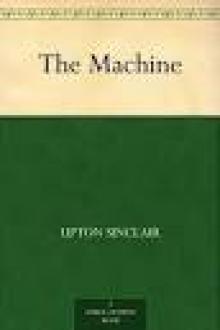 The Machine
The Machine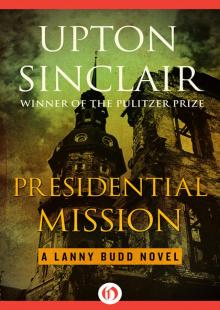 Presidential Mission
Presidential Mission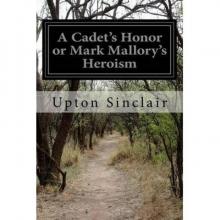 A Cadet's Honor: Mark Mallory's Heroism
A Cadet's Honor: Mark Mallory's Heroism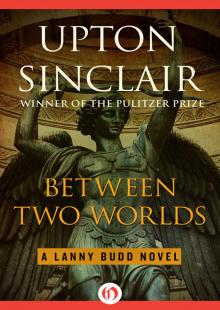 Between Two Worlds
Between Two Worlds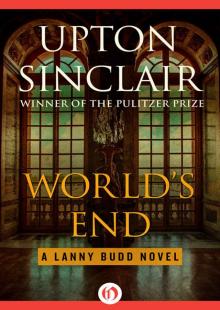 World's End (The Lanny Budd Novels)
World's End (The Lanny Budd Novels)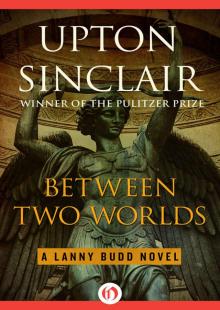 Between Two Worlds (The Lanny Budd Novels)
Between Two Worlds (The Lanny Budd Novels)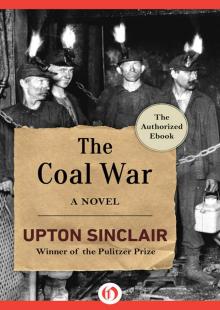 The Coal War
The Coal War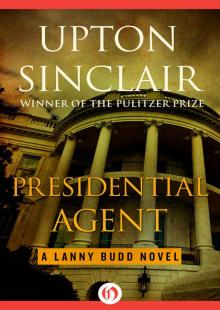 Presidential Agent (The Lanny Budd Novels)
Presidential Agent (The Lanny Budd Novels)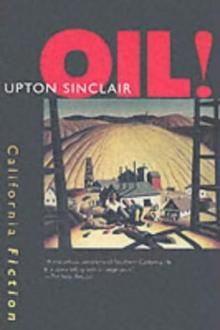 Oil (filmed as There Will Be Blood)
Oil (filmed as There Will Be Blood)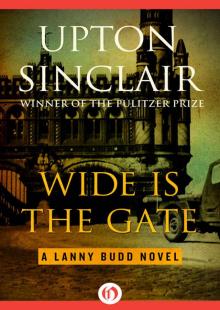 Wide Is the Gate (The Lanny Budd Novels)
Wide Is the Gate (The Lanny Budd Novels)